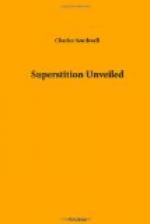These remarks are certainly not calculated to make ‘considering men’ put their trust in Scripture. Coming from a Protestant Divine of such high talent and learning, they may rather be expected to breed in ‘considering men’ very unorthodox opinions as well of the authenticity as the genuineness of both Testaments, and a strong suspicion that Chillingworth was joking when he talked about their “sufficient certainty.” The author has searched Scripture in vain for ’sufficient certainty,’ with respect to the long catalogue of religious beliefs which agitate and distract society. Laying claim to the character of a ‘considering man,’ he requires that Scripture to be proved the word of a God before appealed to, as His Revelation; a feat no man has yet accomplished. Priests, the cleverest, most industrious, and least scrupulous, have tried their hands at the pious work, but all have failed. Notwithstanding the mighty labours of our Lardner’s and Tillemont’s and Mosheim’s, no case is made out for the divinity of either the Old or New Testament. ‘Infidels’ have shown the monstrous absurdity of supposing that any one book has an atom more divinity about it than any other book. These ‘brutes’ have completely succeeded in proving that Christianity is a superstition no less absurd than Mohammedanism, and to the full as mischievous.
Christian practice is after all, the best answer to Christian theory. Men who think wisely, do not, it is true, always act wisely; but generally speaking, the moral, like the physical tree, is known by its fruit, and bitter, most bitter, is the fruit of that moral tree, the followers of Jesus planted. Notwithstanding their talk about the pure and benign influence of their religion, an opinion is fast gaining ground, that Bishop Kidder was right, when he said, were a wise man to judge of religion by the lives of its professors, perhaps, Christianity is the last he would choose.
He who agrees with Milton that
To
know what every day before us lies
Is
the prime wisdom,




